Is anybody there? Does anybody care? That certainly seems to echo the sentiments of our country at present where large groups of people are concerned. When the Founding Fathers of this infantile country set out to free themselves from the tyranny of King George and the mighty English Empire… well, what we’ve got here in 2023? I’m sure they never could have dreamed of this. The story is history, that much is true. (Give or take the creative liberties that musical theatre folk tend to put together when they’re spinning history into a stage musical.) And 1776 is no stranger to ‘history live on stage with music.’ But this radical new renovation on the iconic musical— to borrow some phrasing from the queens of Six— is about to get a his-story remix. This inspiring new production, featuring only actors who identify as women, trans, and non-binary take up the mantles of the ‘founding fathers’ in their recreation of the Second Continental Congress and its debate and fight for freedom. Based on the concept by Sherman Edwards and the original Broadway production produced by Stuart Ostrow, this 1776 ain’t your grandpa’s 1776 and that’s for damn sure! Directed by Jeffrey L. Page and Diane Paulus, with Choreography by Jeffrey L. Page, and musical supervision by Ryan Cantwell, America’s about to get schooled in how things went down versus how they should have gone done, not quite 250 years ago.
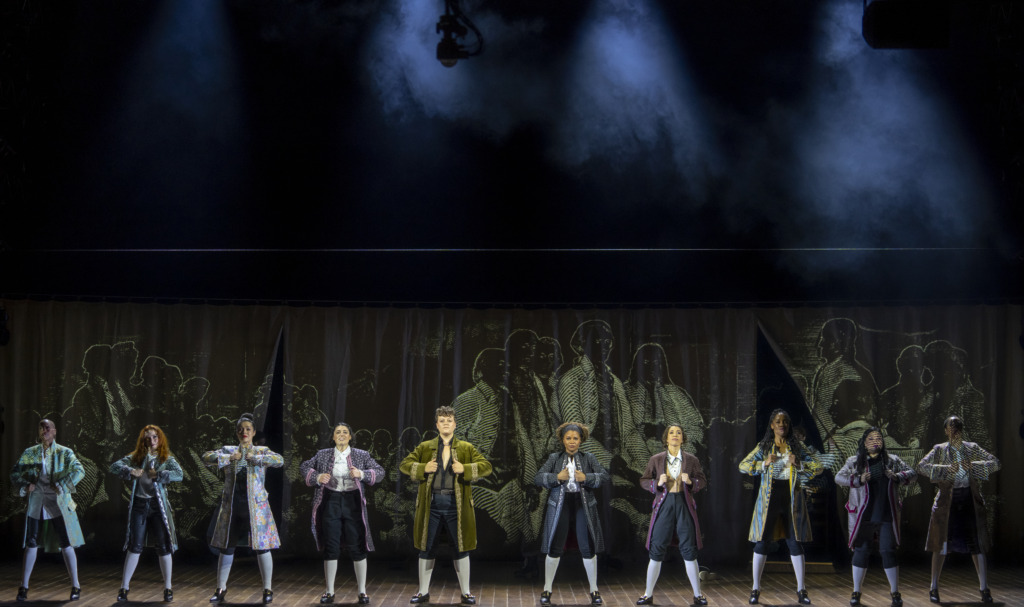
I know the concept seems overly ‘woke’ (and to quote Franklin, “oh, that word!”) and there are people out there who will take one look at this ‘concept’, roll their eyes, and move along. Well, more’s the loss and pity for them. What had the potential to be a hyper-chaotic-soap-box of the times is actually an astonishingly relevant, poignant, and meaningful production that is both heartfelt, humorous, and speaks to the truth of the narrative, from a different perspective without smacking home the agenda of female representation with a sledgehammer. If there’s a fault to be found with this 1776 it’s that it’s only in town for a couple of weeks. (Tour bookings, yadda yadda yadda, but something this significant should hang around in the nation’s capital for a little while longer, in my opinion.) It’s a bombastic explosion of history, knowledge, empowerment, and a lot of ‘sending it up’ because men really mucked it up the first time around and by having an all women/non-binary/trans cast, you really appreciate the nuances of that.
Scott Pask’s set design seems lackluster, at first. It’s a curtain. But oh the projections that hit that curtain! Projection Designer David Bengali really lights up the curtain and backing scrim with dynamic images— not the least of which are the polling in the ‘yay and nay’ columns when the congressional delegates are polled— many of which are patriotic in nature but give you that double-meaning when you see them. Working in tandem with Lighting Designer Jen Schriever’s illuminating tactics, you’re in for a show that’s more dazzling than fireworks (and this show isn’t having the profound negative impact on the air quality the way fireworks do, so three cheers for that!) From the opening, colorful projection of the congress as it stands, through to the show’s end the visual wonders that Bengali provides, aided and assisted by Pask and Schriever, are amazing.
What’s even more so is the chilling setup that Jeffrey L. Page sets in motion with his choreographed routine to get the show underway. Yes, the John Addams character comes out and makes an introduction, but then we see the ensemble, in street clothes, step onto the stage, and literally step into the shoes (those shiny black, gold-buckle shoes of the time) of the founding fathers, which is the literal and metaphorical transition that takes them from performers to characters; it’s striking and disarming to watch and so very clever in its execution. They roll up their stockings, don the jackets of the period (by way of Costume Designer Emilio Sosa) and its off to the races they go. And that’s just one, strikingly memorable moment of dozens that Page achieves with his fluid choreography and dance-like movements all throughout the production. During “Piddle, Twiddle, and Resolve” you get a lot of under-table shuffling and seated foot choreography which falls perfectly in rhythm with the staccato nature of the number. Sosa’s costumes are on fire as well (the good, impressive kind of fire, not the dumpster fire kind that this country seems to be supporting as of late), really giving some pop and edge to the overall couture featured in the production.
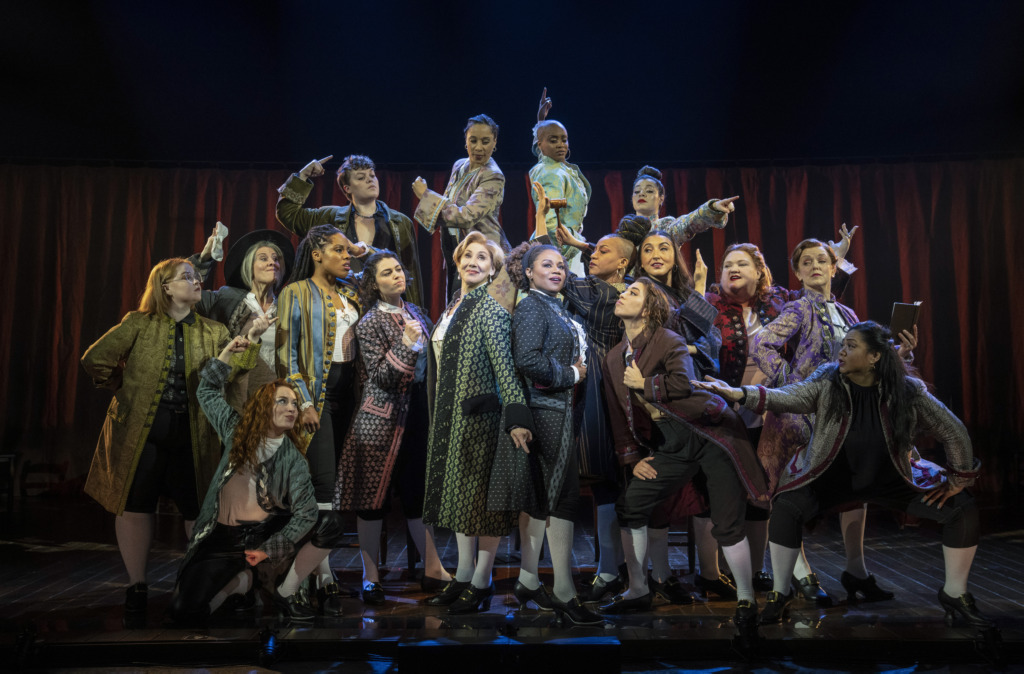
Having seen multiple productions of 1776 over the last decade (at the professional level, community level, collegiate level, and everything you can think of in-between) I can say with unwavering certainty that this production has the best balanced harmonies and vocalizations, bar none, hands down. Particularly during “But, Mr. Adams” where the tail-end of each verse ends with a very complex harmony that often goes horribly awry, this team of performers (under the supervision of Vocal Designer AnnMarie Milazzo and Music Supervisor Ryan Cantwell) nails it and makes it sound beautiful. Dialect Coach Erika Bailey adds to the exceptional aural pleasures of this show, exacting flawless sounds during lengthy scenes of spoken dialogue, particularly when it comes to some of the southern delegates. Rutledge of South Carolina and Doctor Lyman Hall of Georgia have poised and polished accents delivered with precision; the thick Scottish brogue featured on Col. McKean of Delaware is still perfectly enunciated and understandable; all of these vocal factors come together under the keen and seasoned practices of Bailey and Milazzo, furthering the enjoyment of the production.
The direction that Directors Jeffrey L. Page and Diane Paulus take the show in runs true to the course of history, but some of the moments hit home differently, hit home more impressively (hell, some of them even just hit home in a way previous productions have failed to do, plain and simple.) One that comes to mind readily is the interpretation of “He Plays The Violin”, a number featuring Martha Jefferson (Connor Lyon, who doubles as Dr. Lyman Hall of Georgia; a brilliant dual casting if ever there was one.) The number becomes almost scandalous in its retelling, with Lyon— as Mrs. Jefferson— delivering almost orgasmic sentiment throughout the song, delivering it with a heightened sense of sexual awareness. This is a brilliant move as it attempts to normalize both women and sexual desires in a time that both entities were treated as taboo. The staging of “Momma, Look Sharp” takes on a darker and deeper meaning in this production as well; it’s already a tragic and somber song. When the Courier (at this performance Candice Marie Woods) comes into the Congress and sings, its generally to an empty chamber, with the exception of McNair (and in some productions, the Leather Apron, who was not included as a character in this production.) For this production, they blackout the stage and invite the majority of the ensemble on stage, dressed in mourning blacks, to strengthen the profound sense of loss felt in this number. It’s a tragically beautiful gut-punch.
The performances across the board in this production are stellar. You never get the sense that anyone is trying to “be a woman” (whatever that means) but rather that they are playing the characters true to form. There’s just a beautiful irony that is deeply satisfying when it comes to watching historical men be worn like costumes by the backbone and nurturing seeds of this nation. It’s not unlike that moment in Hamilton (where actors of color play founding-father characters who were acknowledged in history as white) and they say “Immigrants, we get the job done.” Everyone finds their moment to shine and it really sheds a glorious light on these historical icons. There are three individuals featured in the production (outside of the ‘two wives’) who are perpetually in the congress without being of the congress. Charles Thomas (Shelby Acosta), who serves as the secretary and reads all of the incoming missives from George Washington at the front. You get a brief highlight of Acosta’s vocal capabilities when she starts off the “Is Anybody There?” number before the John Adams character overtakes it. There’s also the aforementioned Courier (at this performance Candice Marie Woods) who has an exquisite voice featured during “Momma, Look Sharp” and McNair (Tiffani Barbour), the congressional custodian. And while Barbour doesn’t get to lend her voice to any particular solo moments, you do get a comical sense of how the congressional custodian functions through her sharp portrayal.
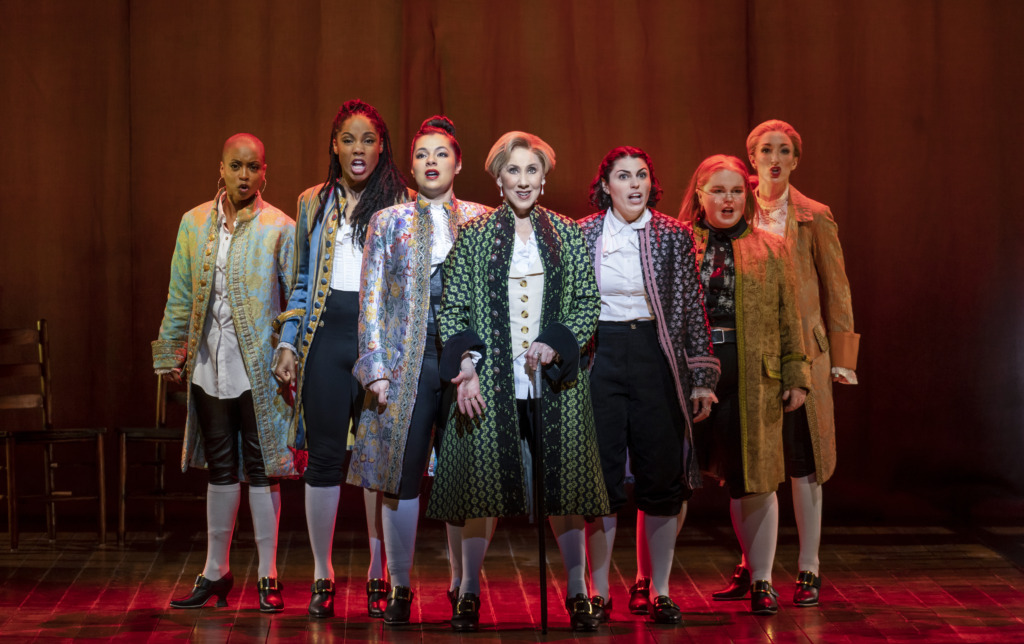
There’s the invigorated Samuel Chase (Lulu Picart) of Maryland, who has one brilliant moment, decrying the glee of finally seeing Washington’s militia in action, and the ailing Caesar Rodney (Jill Marie Vallery) of Delaware, who most painstakingly and truthfully apologizes for leaving John Adams a ‘divided Delaware’ when the character is forced to ride home to die in peace from cancer. The other two thirds of Delaware include the bombastic Col. McKean (Dawn Cantwell) and the weaselly, obnoxity that is George Read (Gwynne Wood.) Quick to second Delaware’s own motions, Wood does a fine job of making the audience dislike the character and primes the audience to readily side with McKean, whose about to use the ‘boomstick’ as a convincing tactic. Ready and willing to side with independence is Dr. Josiah Bartlett (Sav Souza) of New Hampshire, and although like some of the other minor congressional players, Souza doesn’t have a particular singing solo, you feel their presence every step of the way on this congressional journey to freedom.
Tottering along boisterously with a great deal of drunken enthusiasm, Julie Cardia wholly embodies Stephen Hopkins of Rhode Island, affectionally and unofficially referred to as the congressional drunk. But even Cardia’s character finds that sobering moment of dismay when things fall apart and says to John Adams, “I’ll be at the pub if I can do you any good there.” It’s a striking moment when defeat hits even the happy-go-lucky, giddy, congressional drunk.
At this performance, the role of North Carolina respectfully yields to Kayla Saunders. Stepping into the part of Joseph Hewes for the night, Saunders plays a delightfully sycophantic suck-up, completely enthralled and ensorcelled by the charlatan charms of South Carolina’s Edward Rutledge (Kassandra Haddock, but we’ll get to that sticky powder keg in a moment.) Saunders lends their voice to the odious “Cool, Cool Considerate Men” (which can be argued by some was only written into the piece so that the John Dickinson character could have a number) and blends beautifully in this song.
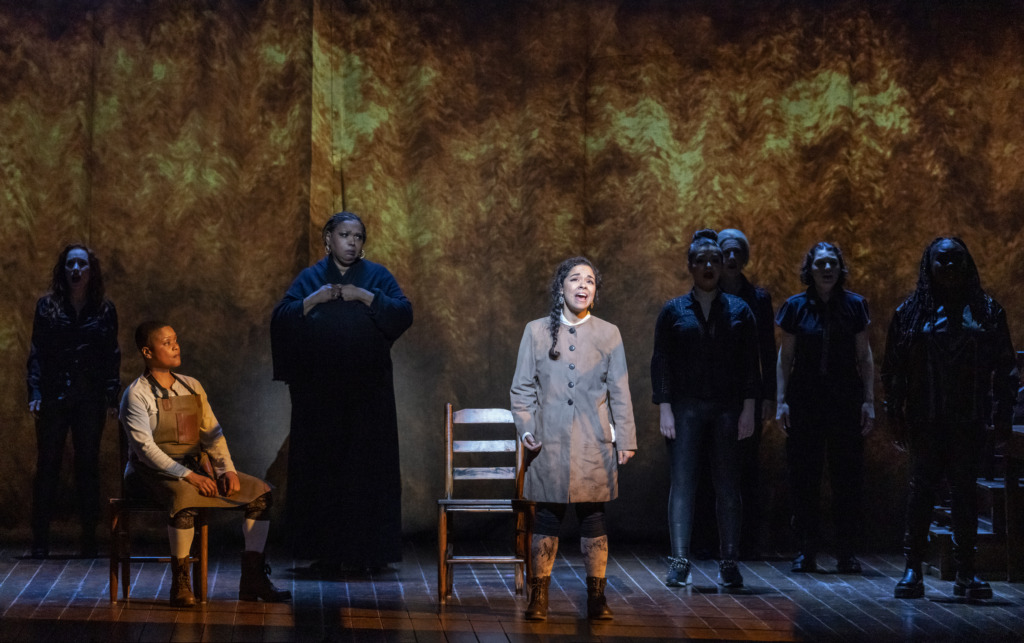
Piddled, twiddled, and dickered and dithered over, Roger Sherman (Anissa Marie Griego) and Robert Livingston (Karole Foreman) form 40% of the declaration of Independence committee and are part of that spectacular blended harmony sound that I mentioned earlier when referencing “But, Mr. Adams.” While Griego and Foreman’s characters are ultimately ‘excused’ for whatever nonsensical reason— babies and cork-popping and whatnot— as history dictates it was Jefferson who penned the declaration, they make their impact felt, heard, and known in both this number and other moments all throughout the congressional proceedings. Foreman in particular is worth noting when attempting to clap back at the reverent John Hancock (Oneika Phillips who commands the congress with her masterful stage presence as if she were truly the second congressional president thereof) about New York and its persistent abstentions. Courteously.
The notion that the vote on independence could come down to just one person seems absurd. Unless you’re a true, versed scholar in this exacting moment of United States History (or have seen 1776 performed some dozen and a half times live at varying venues throughout the years like I have), you may be of the opinion that it was John Adams and Thomas Jefferson, and possibly Benjamin Franklin, who made independence happen. But it was Judge Wilson (Ariella Serur) whose wishes of remaining ‘anonymous as one among many’ really pushed it through. Serur does a superb job of existing inside the shadow of John Dickinson but really pulls everyone’s attention when the final decision has to be made. It’s a remarkable quality and capability, one at which Serur excels.
Emphatic-lee! Energetic-lee! Uncatagoric-lee! That’s Richard Henry Lee (Shawna Hamic) whose larger-than-life personality is belting out “The Lees of Old Virginia” most enthusiastic-lee! The southern drawl, the twangy confidence, and all the smug charm of a polished politician can be found in Hamic’s hilarious, albeit brief, performance of this zany character. While the libretto doesn’t give Richard Henry Lee much of anything to do once he rides off for Independence and comes back with a resolution, you won’t soon forget Hamic’s iconic performance in the role, particularly as she marches and struts and belts with bravado all through that up-tempo, hysterical number.
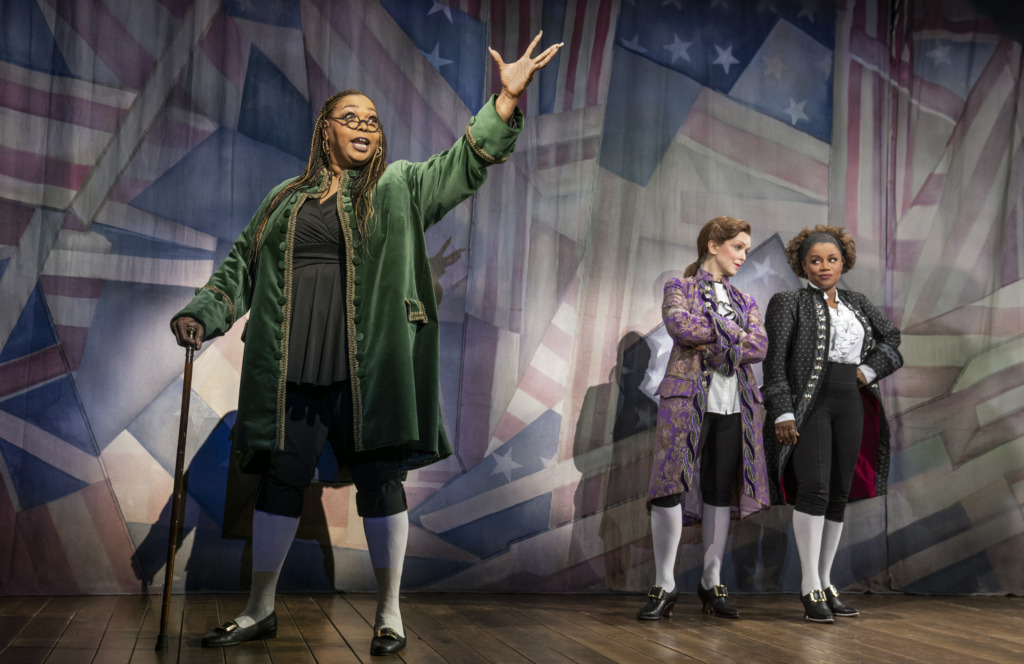
The real women of history— Martha Jefferson (Connor Lyon) and Abigail Addams (at this performance Brooke Simpson)— are featured only briefly in the 1776 libretto, and more traditionally are presented as ‘letter senders’ and ‘inspiration’. There’s something about the way they are presented in this production that makes these historical women feel necessary and as, if not more, important as their historical male counterparts. Lyon’s Martha Jefferson is both winsome and wild, full of taboo expressions (which you can hear echoed in her dual portrayal as Dr. Lyman Hall of Georgia, though with tempered intelligence and reservation) and lively, even when she’s dismissing Franklin and Adams. Brooke Simpson’s Abigail Adams is wise, sage and sound. In her duets with John Adams, you get a sense of importance and reverent respect for her place in his life and her place in history, rather than the more traditional nagging or worried ‘wife-back-home.’ And when she bursts forth with the gifts of saltpeter, and all of the inclusivity mentioned in the various women’s clubs who made them, it’s this great, triumphant moment of pride that resonates through the house splendidly.
Calling them villains— Dickinson and Rutledge— feels oddly appropriate and deeply wrong at the same time— but the antagonizing forces that drive the play forward, in additional to all of the historical circumstances, comes from John Dickinson (Joanna Glushak) of Pennsylvania and Edward Rutledge (Kassandra Haddock) of South Carolina. Glushak is nothing shy of the agitator that her character accuses John Adams of being where is Haddock takes a more subtle, almost sublime and charming approach to villainy. The knockdown, drag-out verbal spar between Glushak’s Dickinson and John Adams is epic, fully-charged, locked-and-loaded, and captivates the entire audience with its intensity. And when Glushak delivers the leading charge if “Cool, Cool Considerate Men” it’s a little like watching a pre-colonial Cruella Deville spin out in a completely unhinged fashion. It’s disturbing and that look of “I’m going to get you and your little dog too” that Glushak wears when leaving the stage at the end of that number is truly frightening.
Though Glushak’s Dickinson looks like sane and salient force of opposition when compared to Haddock’s Rutledge, though only once the Rutledge character launches into that brutal number, “Molasses to Rum.” Vicious, powerful, and completely unchecked energy dominates this number and it is a harrowing brutality to watch. Haddock is a powerhouse performer who really nails home the sincerely terrifying truth that is the south’s belief in slavery and their attempt to call kinship between their brothers in Boston. In addition to this gut-punch, jaw-dropping solo number, Haddock carries the character with a flawless southern charm that reeks of entitlement masked by the odious perfume of gentility. She has truly done a stupendous job of portraying this villainy, attempting to masquerade itself as a fine gentleman of the south.
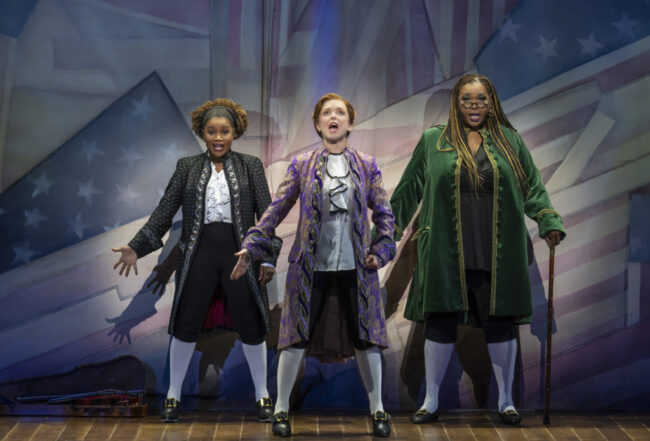
Amazement seems to know no bounds in this production as the goodly Thomas Jefferson (Nancy Anderson) plays the violin. You can watch Anderson’s fingers as she bows and just melt along to her ministrations with the strings. Though Jefferson’s character doesn’t speak much, Anderson does not let that impede her superb performance, particularly when it comes to telling off John Adams. And the facial expressions that Anderson delivers, especially when engaging in hostilities with Adams, are priceless. Lending her smooth vocals to both “But, Mr. Adams” (including the elevated octave option in that number) and in “The Egg” (which in this production sounds remarkable compared to how it normally sounds), it is easy to enjoy Anderson as the writer of The Declaration of Independence.
Full of the comic humors of life, Liz Mikel is making Benjamin Franklin the comic cad we all want him to be. With a bold and boisterous singing sound as well as an infectious laugh when making light of various situations, Mikel makes Benjamin Franklin feel as if he was born in history as a sassy, sharp-tongued, woman with brains to outmatch them all. Mikel’s precise sense of comedic timing is impeccable but there’s more to her portrayal than just the funny bits. When the end draws nigh and the iconic line, “We’re men, no more no less, trying to get a nation started against greater odds than a more generous God would have allowed” Mikel delivers that moment with such grounded reverence and humility that you feel her pain in saying it. It’s not defeat, its resignation; win the war, not the battle. Mikel’s interactions with John Adams (Gisela Adisa) are sheer perfection.
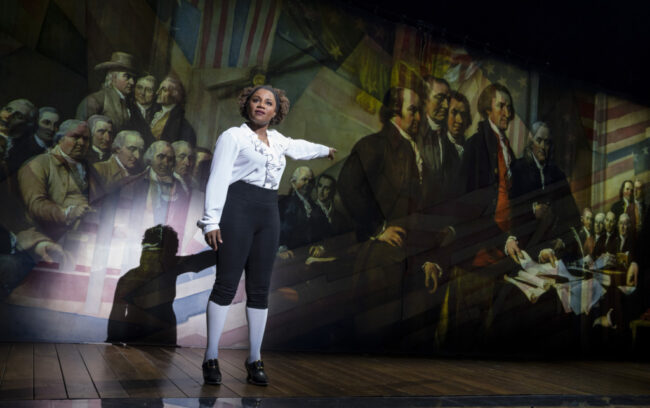
A true, bombastic, double-barrel pistol, Gisela Adisa plays John Adams like no other. There’s fire in her guts, conviction in her speaking voice, and her singing is mind-blowing, loaded with tonal perfection as well as passion and intensity. Barking back at “Sit Down, John!” and pattering through bits of “Piddle, Twiddle, and Resolve”, you get the sense that there isn’t much that Adisa can’t do when it comes to performance. She’s a narrative beacon, guiding the audience, the congress, the America of the future, through its paces to Independence. Comically sharp, Adisa plays perfectly off of Franklin, Jefferson, and even during the interactions with Abigail Adams. Her voice marries divinely against Brooke Simpsons’ during “Till Then”, giving you this gorgeous duet of romantic intent. And when Adisa finally delivers “Is Anybody There?” it’s vocal intensity like nothing else in the production; all of the feelings, all of the frustrations, all of the hopes and dreams and everything in-between to get them to that moment come firing out of her character like a true conflagration for freedom. It’s perfection.
This is the 1776 you want to see. It just makes so much more sense. (And the harmonies sound better!) Maybe if the founding fathers had more voices of women, non-binary individuals, and trans-individuals among them, this country wouldn’t be in the sorry state it’s presently in. 1776 is a reckoning; don’t miss your chance to see history done right in DC this July.
Running Time: 2 hours and 45 minutes with one intermission
1776 plays through July 16th 2023 series in the Eisenhower Theatre at The John F. Kennedy Center for the Performing Arts, 2700 F Street NW, Washington, DC. For tickets call the box office at (202) 467-4600 or purchase them online.




